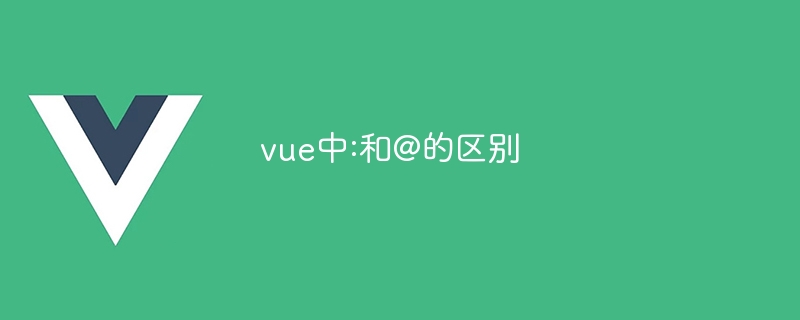In vue: the difference with @
The colon (:) uses data binding events, and the at symbol (@) uses method events. Colon binding has higher priority, event modifiers can be used, and the at symbol syntax is more concise.

In Vue: The difference between @
In Vue, the colon (:) and the at symbol (@ ) is a different syntax for binding event handlers. The main differences between them are as follows:
Uses:
- ##Colon (:) is used for bindingData binding Define the event (such as v-model).
- at symbol (@) is used to bind method events (such as v-on:click).
Example:
-
Data binding (colon):
When When the content of the input box changes, it updates the<input v-model="message">
Copy after loginmessage
data. Method event (at symbol):
When the button is clicked, the<button @click="handleClick">Click Me</button>
Copy after loginhandleClick
method will be called.
Other differences:
- Priority: Event handlers bound by colons have a higher priority than The handler for the at symbol binding.
- Event modifiers: Events bound by the colon can apply event modifiers (such as .stop or .prevent), but events bound by the at symbol cannot.
- Syntactic simplicity: The at symbolic syntax is generally more concise because it does not require specifying an event name.
Usage Guidelines:
In general, the following guidelines should be used:- For data-bound events, use colons (such as v-model).
- For events that require calling methods, use the at symbol (such as v-on:click).
The above is the detailed content of In vue: the difference with @. For more information, please follow other related articles on the PHP Chinese website!

Hot AI Tools

Undresser.AI Undress
AI-powered app for creating realistic nude photos

AI Clothes Remover
Online AI tool for removing clothes from photos.

Undress AI Tool
Undress images for free

Clothoff.io
AI clothes remover

AI Hentai Generator
Generate AI Hentai for free.

Hot Article

Hot Tools

Notepad++7.3.1
Easy-to-use and free code editor

SublimeText3 Chinese version
Chinese version, very easy to use

Zend Studio 13.0.1
Powerful PHP integrated development environment

Dreamweaver CS6
Visual web development tools

SublimeText3 Mac version
God-level code editing software (SublimeText3)

Hot Topics
 How to use echarts in vue
May 09, 2024 pm 04:24 PM
How to use echarts in vue
May 09, 2024 pm 04:24 PM
Using ECharts in Vue makes it easy to add data visualization capabilities to your application. Specific steps include: installing ECharts and Vue ECharts packages, introducing ECharts, creating chart components, configuring options, using chart components, making charts responsive to Vue data, adding interactive features, and using advanced usage.
 The role of export default in vue
May 09, 2024 pm 06:48 PM
The role of export default in vue
May 09, 2024 pm 06:48 PM
Question: What is the role of export default in Vue? Detailed description: export default defines the default export of the component. When importing, components are automatically imported. Simplify the import process, improve clarity and prevent conflicts. Commonly used for exporting individual components, using both named and default exports, and registering global components.
 How to use map function in vue
May 09, 2024 pm 06:54 PM
How to use map function in vue
May 09, 2024 pm 06:54 PM
The Vue.js map function is a built-in higher-order function that creates a new array where each element is the transformed result of each element in the original array. The syntax is map(callbackFn), where callbackFn receives each element in the array as the first argument, optionally the index as the second argument, and returns a value. The map function does not change the original array.
 What are hooks in vue
May 09, 2024 pm 06:33 PM
What are hooks in vue
May 09, 2024 pm 06:33 PM
Vue hooks are callback functions that perform actions on specific events or lifecycle stages. They include life cycle hooks (such as beforeCreate, mounted, beforeDestroy), event handling hooks (such as click, input, keydown) and custom hooks. Hooks enhance component control, respond to component life cycles, handle user interactions and improve component reusability. To use hooks, just define the hook function, execute the logic and return an optional value.
 Promise usage in vue
May 09, 2024 pm 03:27 PM
Promise usage in vue
May 09, 2024 pm 03:27 PM
Promise can be used to handle asynchronous operations in Vue.js. The steps include: creating a Promise object, performing an asynchronous operation and calling resolve or reject based on the result, and processing the Promise result (use .then() to handle success, .catch() to handle errors) . Advantages of Promises include readability, ease of debugging, and composability.
 validator method in vue
May 09, 2024 pm 04:09 PM
validator method in vue
May 09, 2024 pm 04:09 PM
The Validator method is the built-in validation method of Vue.js and is used to write custom form validation rules. The usage steps include: importing the Validator library; creating validation rules; instantiating Validator; adding validation rules; validating input; and obtaining validation results.
 How to disable the change event in vue
May 09, 2024 pm 07:21 PM
How to disable the change event in vue
May 09, 2024 pm 07:21 PM
In Vue, the change event can be disabled in the following five ways: use the .disabled modifier to set the disabled element attribute using the v-on directive and preventDefault using the methods attribute and disableChange using the v-bind directive and :disabled
 How to isolate styles in components in vue
May 09, 2024 pm 03:57 PM
How to isolate styles in components in vue
May 09, 2024 pm 03:57 PM
Style isolation in Vue components can be achieved in four ways: Use scoped styles to create isolated scopes. Use CSS Modules to generate CSS files with unique class names. Organize class names using BEM conventions to maintain modularity and reusability. In rare cases, it is possible to inject styles directly into the component, but this is not recommended.






